Turmeric Diet Benefits
Many people believe in the power of Turmeric as a weight loss supplement and diet aid. Turmeric is commonly thought of as a yellow spice that gives flavor to curry but, it is much more than that. Turmeric is valued for more than just its cooking uses. The herb has been used in the Ayurvedic healing tradition for centuries. The active ingredients in Turmeric are a group of plant substances called curcuminoids. Known collectively as “curcumin”, curcuminoids have demonstrated potent antioxidant properties in scientific studies. Curcuminoids benefit joints and other tissues by helping to neutralize free-radicals. Through its antioxidant mechanisms, curcumin supports colon health, exerts neuroprotective activity and helps maintain a healthy cardiovascular system. Among all its benefits Turmeric is also believed to help block the absorption of fat and aid in weight loss.
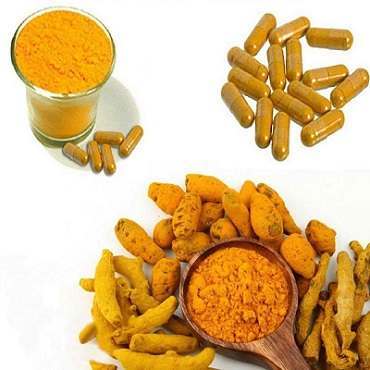 What is the Turmeric Diet?
What is the Turmeric Diet?
The Turmeric diet is where you take Turmeric directly as a supplement, not just via food as a seasoning. Although using turmeric in your daily cooking is one way to spice up your meal you likely need to take supplements to start getting the turmeric curcumin you need to start seeing results right away. This is especially true as some people have difficulty taking turmeric directly.
Please note — there are a variety of products on the market and sorting through them and selecting the best one for your needs can be confusing. Many companies trying to cash in on trends do not really care about the quality of their product, therefore their products may be ineffective.
As a safe rule of thumb the daily dosage of turmeric you should be getting is between 2 and 3 grams per day. Do not oversdose on turmeric — when consuming turmeric supplements try to remain within the daily limits by taking into consideration the turmeric you are getting from other sources such as your food.
 Turmeric curcumin has an effect on your body inhibiting the cell division of fat cells. The mechanism by which turmeric helps you block fat is straightforward. Curcumin inhibits the formation of fatty tissue by blocking the method used to form it. It does this by supressing your blood vessels used to form fat tissue.
Turmeric curcumin has an effect on your body inhibiting the cell division of fat cells. The mechanism by which turmeric helps you block fat is straightforward. Curcumin inhibits the formation of fatty tissue by blocking the method used to form it. It does this by supressing your blood vessels used to form fat tissue.
The general train of thought regarding fat is that the amount you have is determined by genetics — family history. The rate and combination of fat cells growing and increasing makes you fat, not consumption of fatty foods alone. (Although diet and exercise in are also an important component.) Curcumin helps slow down the division of fat cells in your body making it harder to gain weight, putting on unwanted pounds of fat.
Remember that no diet is perfect and neither is the turmeric diet. We recommend talking to your doctor before undergoing any health program or plan. Staying within the recommended dosage guidelines.
People with liver problems, and pregnant women should proceed with caution as their risks for side effects are higher. Potential side effects of turmeric include allergic reactions, bile duct damage, and liver damage.

 Subscribe Now
Subscribe Now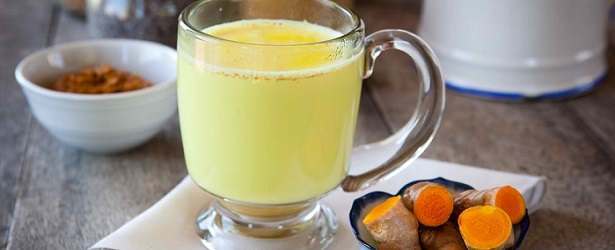

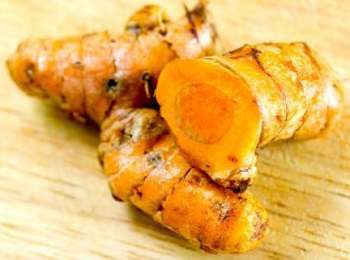 Cancer researchers believe that turmeric and its consumption has a great positive effect on cancer and dementia diseases. Turmeric is a natural anti-inflammatory, it inhibits the growth of new blood vessels in tumours and it’s a powerful
Cancer researchers believe that turmeric and its consumption has a great positive effect on cancer and dementia diseases. Turmeric is a natural anti-inflammatory, it inhibits the growth of new blood vessels in tumours and it’s a powerful  4. Combats inflammatory diseases
4. Combats inflammatory diseases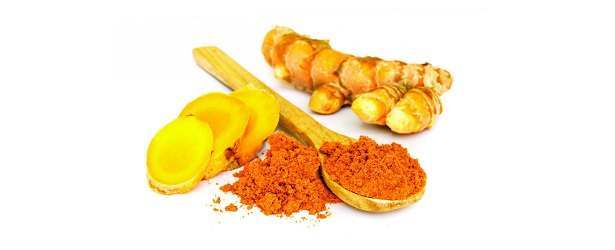
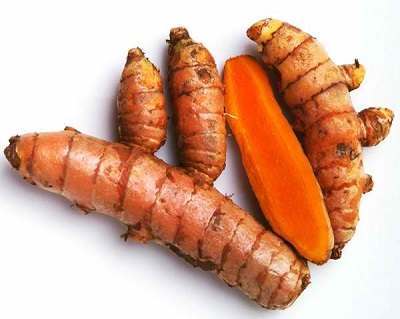 The Turmeric root has a dark brown skin on the exterior and deep orange-yellow flesh internally. Its leaves as well as rhizome features unique flavor and fragrance. Its taste is described as mild peppery to warm and bitter. Its fragrance is sweet and pleasant, slightly reminiscent of a mix of orange-zest, and ginger to which it is related. Once harvested, the root is boiled, dried, and ground to prepare distinctive bright yellow spice powder.
The Turmeric root has a dark brown skin on the exterior and deep orange-yellow flesh internally. Its leaves as well as rhizome features unique flavor and fragrance. Its taste is described as mild peppery to warm and bitter. Its fragrance is sweet and pleasant, slightly reminiscent of a mix of orange-zest, and ginger to which it is related. Once harvested, the root is boiled, dried, and ground to prepare distinctive bright yellow spice powder.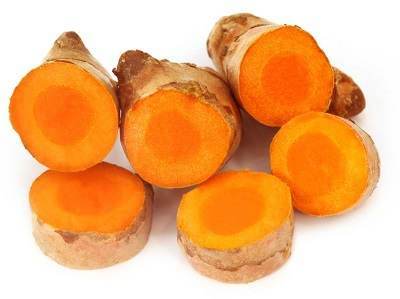 Turmeric contains high amounts of minerals such as calcium, iron, potassium, manganese, copper, zinc, and magnesium. Potassium is an important component of cell and body fluids that helps control heart rate and blood pressure. Manganese is used by the body as a co-factor for the antioxidant enzyme, superoxide dismutase.
Turmeric contains high amounts of minerals such as calcium, iron, potassium, manganese, copper, zinc, and magnesium. Potassium is an important component of cell and body fluids that helps control heart rate and blood pressure. Manganese is used by the body as a co-factor for the antioxidant enzyme, superoxide dismutase.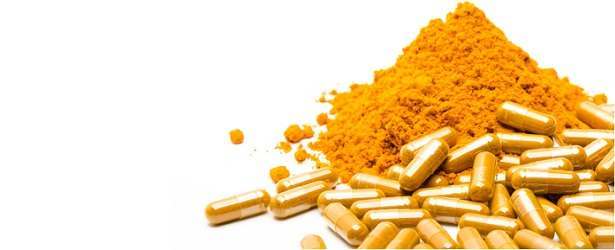
 Anti-inflammatory drugs
Anti-inflammatory drugs Turmeric is especially effective in easing depression in laboratory animals. At this time it is only recommended to treat mild depression.
Turmeric is especially effective in easing depression in laboratory animals. At this time it is only recommended to treat mild depression. Turmeric is excellent for lowering blood sugar and increasing insulin resistance.
Turmeric is excellent for lowering blood sugar and increasing insulin resistance. Turmeric Side Effects
Turmeric Side Effects
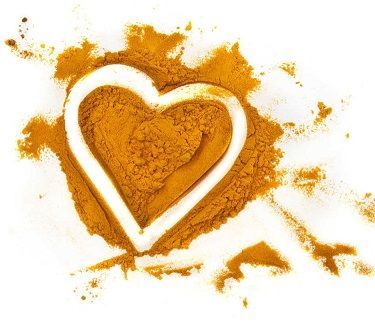 Turmeric has the following effects and health and general benefits:
Turmeric has the following effects and health and general benefits: As a known anti-inflammatory, Turmeric is widely used to ease inflammation. Inflammation takes many forms, and it can occur in many places throughout the body. One such is the brain, where Alzheimer’s disease forms. Researchers performed a study the effect of curcumin on the combined damage that occurs as a response to amyloid formation in Alzheimer’s-predisposed mice. In the study, the mice were tested with both low and high doses of dietary curcumin to determine its effect on inflammation, oxidative damage, and plaque pathology. Both the low and high doses of curcumin were found to succeed in reducing inflammation and oxidative damage.
As a known anti-inflammatory, Turmeric is widely used to ease inflammation. Inflammation takes many forms, and it can occur in many places throughout the body. One such is the brain, where Alzheimer’s disease forms. Researchers performed a study the effect of curcumin on the combined damage that occurs as a response to amyloid formation in Alzheimer’s-predisposed mice. In the study, the mice were tested with both low and high doses of dietary curcumin to determine its effect on inflammation, oxidative damage, and plaque pathology. Both the low and high doses of curcumin were found to succeed in reducing inflammation and oxidative damage.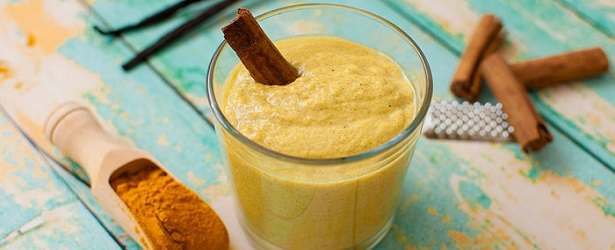
 Turmeric may also be drank as a milk. In fact, many people take turmeric with milk for general health benefits. When you combine it with milk, turmeric is used as a drink, lotion or even a face mask.
Turmeric may also be drank as a milk. In fact, many people take turmeric with milk for general health benefits. When you combine it with milk, turmeric is used as a drink, lotion or even a face mask. Turmeric Face Mask Directions — This is great for acne. To use as a mask or wash, take ¼ cup of whole milk and add to this ½ teaspoon ground turmeric. Take a clean washcloth, soak in the mixture and apply to affected skin. Leave it for 10 minutes before washing off.
Turmeric Face Mask Directions — This is great for acne. To use as a mask or wash, take ¼ cup of whole milk and add to this ½ teaspoon ground turmeric. Take a clean washcloth, soak in the mixture and apply to affected skin. Leave it for 10 minutes before washing off.
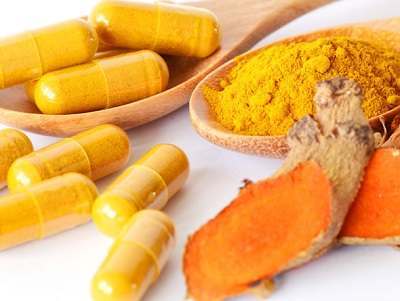
 Another note — Although there is no specific research with regards to curcumin, when nutrients are not consumed with the other nutrients they naturally occur with, they are poorly absorbed. It is possible that this is also true for curcumin.
Another note — Although there is no specific research with regards to curcumin, when nutrients are not consumed with the other nutrients they naturally occur with, they are poorly absorbed. It is possible that this is also true for curcumin.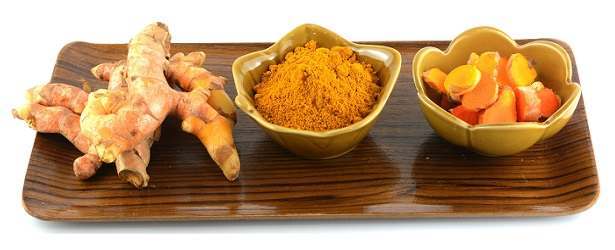

 Uterine Effects
Uterine Effects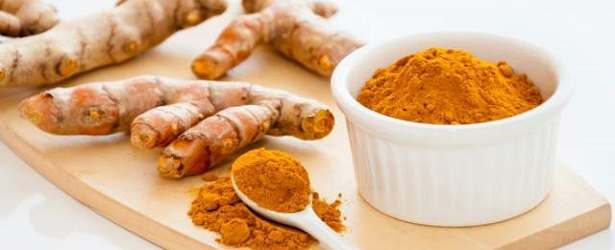
 An effective relief for depression
An effective relief for depression This is done by increasing a growth hormone in the brain called BDNF. When this hormone decreases in the brain it becomes prone to multiple disorders such as depression and
This is done by increasing a growth hormone in the brain called BDNF. When this hormone decreases in the brain it becomes prone to multiple disorders such as depression and 
 Major signs of
Major signs of  A preliminary clinical study conducted on eighteen patients suffering from rheumatoid arthritis indicated that a dosage of 1200 mg of curcumin supplements on a daily basis for a two-week period proved to be beneficial in helping to stabilize and relieve most of the usual symptoms associated with their condition.The resulting relief was just as good as that of renown prescription drugs,and yet without the usual side effects that are common with conventional prescriptions. It is also believed that combining turmeric with ginger and taking it on a regular basis may confer immense relief benefits to fibromyalgia patients. Alternative treatments such as such as turmeric may also offer alleviation in a much safer manner even when it is used for the long-term. Curcumin,an active component of turmeric can also offer anti-inflammation relief that may also be of great benefit to the treatment of this condition as well. Although the medicinal effects of curcumin in clinical studies are still in their initial stages, the results it has demonstrated in lab tests and rodents are a valid that needs to be followed up.As at now,we can talk about its impact in regard to anti-cancer effects,cardio-vascular effects,ability to boost and restore memory and various ulcer conditions even though more scientific research is still necessary in order to add more weight to the validity of these benefits.
A preliminary clinical study conducted on eighteen patients suffering from rheumatoid arthritis indicated that a dosage of 1200 mg of curcumin supplements on a daily basis for a two-week period proved to be beneficial in helping to stabilize and relieve most of the usual symptoms associated with their condition.The resulting relief was just as good as that of renown prescription drugs,and yet without the usual side effects that are common with conventional prescriptions. It is also believed that combining turmeric with ginger and taking it on a regular basis may confer immense relief benefits to fibromyalgia patients. Alternative treatments such as such as turmeric may also offer alleviation in a much safer manner even when it is used for the long-term. Curcumin,an active component of turmeric can also offer anti-inflammation relief that may also be of great benefit to the treatment of this condition as well. Although the medicinal effects of curcumin in clinical studies are still in their initial stages, the results it has demonstrated in lab tests and rodents are a valid that needs to be followed up.As at now,we can talk about its impact in regard to anti-cancer effects,cardio-vascular effects,ability to boost and restore memory and various ulcer conditions even though more scientific research is still necessary in order to add more weight to the validity of these benefits.